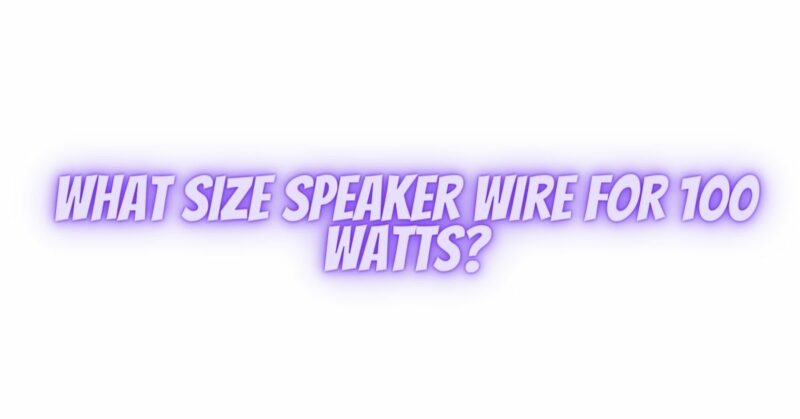Choosing the right size of speaker wire is essential to ensure optimal audio performance and prevent power loss in your audio system. When dealing with a 100-watt amplifier or speaker, selecting an appropriate gauge (thickness) of speaker wire is crucial. In this article, we’ll explore the factors that determine the correct speaker wire size for a 100-watt application and offer some practical guidelines.
Factors to Consider:
1. Distance:
The distance between your amplifier or receiver and your speakers plays a significant role in determining the appropriate wire gauge. Longer cable runs result in higher resistance, which can lead to power loss and decreased audio quality.
2. Speaker Impedance:
The impedance of your speakers is a critical factor. Common speaker impedance ratings are 4 ohms, 6 ohms, and 8 ohms. Lower impedance speakers draw more current, requiring thicker wire to minimize power loss.
3. Wire Resistance:
Thicker speaker wire has lower resistance, reducing power loss over long cable runs. Thinner wire has higher resistance and may lead to a loss of power, particularly in high-wattage systems.
4. Power Handling:
Consider the power handling capabilities of your speakers. If your speakers can handle significantly more than 100 watts, it’s advisable to use thicker wire to ensure they receive the full power without loss.
Speaker Wire Gauge Recommendations for 100 Watts:
Here are some general guidelines for selecting the appropriate speaker wire gauge for a 100-watt application, taking into account various factors:
- Short Distances (Less than 20 feet): For short cable runs, up to approximately 20 feet, 16-gauge speaker wire is usually sufficient for 100-watt systems, especially when using 8-ohm speakers.
- Moderate Distances (20 to 50 feet): If your speakers are located further away from the amplifier (20 to 50 feet), consider using 14-gauge wire for 100-watt systems to minimize power loss.
- Long Distances (Over 50 feet): For longer cable runs beyond 50 feet, or if you have low-impedance speakers (e.g., 4 ohms), it’s recommended to use 12-gauge speaker wire to ensure efficient power transfer.
- High-Powered Systems: If you have high-powered speakers or plan to use the full 100 watts frequently, choosing a thicker gauge like 12 or even 10 (for very long runs) can provide better power delivery and minimize resistance.
Final Considerations:
- Bi-Wiring and Bi-Amping: In some advanced audio setups, you may encounter bi-wiring or bi-amping configurations, which require additional sets of speaker wires. Ensure that each set of wires matches the recommendations for your system.
- Quality of Wire: Invest in high-quality speaker wire with good conductivity and insulation. Quality wire can make a noticeable difference in audio performance.
- Consult Manufacturer Specifications: Always refer to the manufacturer’s specifications for your speakers and amplifier to ensure you are using the appropriate wire gauge for your specific equipment.
In summary, when dealing with a 100-watt audio system, the choice of speaker wire gauge depends on factors like distance, speaker impedance, and power handling capabilities. Following the recommended guidelines will help you select the right wire gauge to maximize audio quality and ensure efficient power transfer to your speakers.

